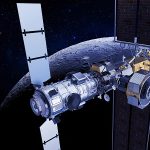Thales has continued to invest in the space ecosystem, with the recent opening of a digital centre of excellence, investments in satellite integration and pressurised module production at its industrial facilities, and the development of FabLabs across Europe.
 Thales Alenia Space logged a number of successes in 2021, including key contracts, major industrial milestones and launches, a series of innovations and new capital investments.
Thales Alenia Space logged a number of successes in 2021, including key contracts, major industrial milestones and launches, a series of innovations and new capital investments.
Last year, Thales confirmed the development contract for the communications and refuelling module ESPRIT on the upcoming Gateway lunar space station. This business win followed two contracts signed in 2020 to produce the I-HAB and HALO pressurised modules. Gateway is being developed within the scope of NASAs Artemis programme, designed to return astronauts to the moon by 2024. The lunar space station will also be used as a waystation to prepare crewed missions to Mars.
Thales also announced an order for two more pressurised cargo modules on Cygnus, the resupply vessel for the International Space Station, and won a contract from Axiom Space to build two pressurised modules for the first commercial space station, Axiom.
It is also playing a major role on the Orion spacecraft, designed to carry astronauts to the moon as part of the Artemis programme, especially as a supplier of thermomechanical systems for the European Service Module (ESM). In 2021, Thales participated in the final integration of critical systems on the second module (ESM 2), and also signed a contract amendment providing for a similar contribution to ESM 4, 5 and 6.
Other highlights in 2021 included significant progress on major programmes such as the second ExoMars mission, to be launched in September 2022, and EUCLID, a science mission dedicated to the study of dark energy and matter.
The second COSMO-SkyMed second-generation satellite was shipped from the companys Rome plant in December 2021 to Cape Canaveral, where its now being readied for the planned launch in late January. The second generation of COSMO-SkyMed radar observation satellites is being built by Thales as the prime contractor on behalf of the Italian space agency and defence ministry. The payload and platform for SWOT, the French-American oceanographic satellite, were integrated in 2021, a major milestone for this revolutionary satellite, slated for launch in 2022.
Capitalising on its globally recognised expertise in constellations, Thales was chosen by the operator Telesat in February 2021 to build Lightspeed, a constellation of 298 telecom satellites in low Earth orbit (LEO). The Lightspeed network will offer data rates of several terabits/second worldwide, providing secure, high-speed and high-performance connectivity for professional applications.
Also in February 2021, Thales and Satelit Nusantara Tiga (SNT) announced that they had finalised funding for the development of the Satria broadband communications satellite, designed to bridge the digital divide in Indonesia. This key step follows the preliminary agreement to start various activities for the satellite, signed in early September 2020.
Thales won five new contracts in 2021 as prime contractor for geostationary satellites. They will build the SICRAL 3A and 3B satellites for the Italian Ministry of Defense, the HTS 113BT satellite for the Indonesian operator Telkomsat, and the ASTRA 1P and ASTRA 1Q satellites for the operator SES. The latter two satellites are based, respectively on the all-electric Spacebus NEO platform, proven in orbit, and Space Inspire, the companys brand new all-digital solution, flexible and reconfigurable in orbit in virtually real-time. Thales ended the year on a high note with these five satellites, giving it leadership in the geostationary telecom satellite market in 2021.
At the forefront of satellite navigation in Europe, Thales was chosen by the European Space Agency (ESA) and the European Commission to build 6 of the 12 new satellites in the second-generation Galileo constellation. Thales also signed an extension of the first-generation Galileo mission and security ground segment contract, to continue increasing the systems operational capacity.
Along with its work on the Galileo satellites, Thales, the prime contractor for Europes EGNOS navigation overlay system, continued to upgrade the ground system to ensure the integrity needed to address ultra-precise and reliable positioning requirements for new and highly demanding applications. These new uses include autonomous road vehicles, as well as autonomous rail and maritime transport systems. The associated high-reliability integrity and safety of life services are already being implemented for aviation. At the same time, Thales successfully carried out several flight demonstrations with ASECNA (air navigation safety agency for Africa and the Indian Ocean), in preparation for a satellite navigation system covering Africa.
Several major satellites with contributions from Thales were launched in 2021 including two geostationary telecom satellites: SES 17 and Syracuse 4A, built by Thales as prime contractor for SES and the French Ministry of the Armed Forces; two Cygnus resupply vessels for the International Space Station; and three CERES military signals intelligence (SIGINT) satellites, with Thales supplying the platforms.
Thales also expanded its European footprint by creating a digital centre of excellence in Luxembourg. The Madrid plant now features a state-of-the-art satellite integration centre, and Turin has doubled production capacity for pressurised modules. A new FabLab has been inaugurated in Charleroi, Belgium, along the lines of those already up and running in Toulouse, Cannes, Rome and Turin. Through these FabLabs, employees can submit ideas that could result in concrete improvements through both professional and personal projects.










































































